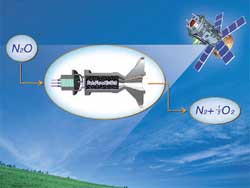
Catalytic decomposition of N2O has received much attention in the development of new space-vehicle propellants as well as environment protection. Especially, thanks to its low toxicity and adaptability to multimode propellant systems, high concentration N2O is regarded as a promising "green" space propellant, which is now under elaborate investigations in many countries. However, this decomposition involves a temperature up to over 1,000 ºC, leading to loss of the catalytic components and sintering of the catalyst supports. This is at present bottle-neck issues in the field.
Studies of a team led by Prof. ZHANG Tao from the CAS Dalian Institute of Chemical Physics will facilitate the development of novel catalysts of iridium substituted hexa-aluminate for the decomposition of N2O.
As reported in the journal
Chem. Comm.(2007, 1695-1697), the team has attained new progress via the incorporation of the active component iridium into the framework of the hexa-aluminate supporting material, which possesses a very high thermal stability. In this way, the newly developed catalyst can simultaneously satisfy the requirements of low temperature start-up activity and high heat resistance of the catalyst for N2O decomposition. Moreover, this research outcome would also be significant for the abatement of N2O in environment protection processes.







